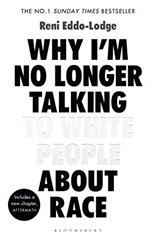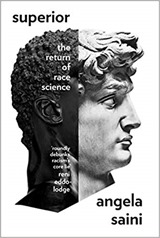 I recently joined the BLAC Liberal Democrats, spurred on by the Black Lives Matter protests last summer, and my varied reading. This book: Why I’m no longer talking to white people about race by Reni Eddo-Lodge seemed appropriate as a next read, it is about the politics of race in the UK. It follows on from reading David Olusoga’s Black and British and Superior: the return of race science by Angela Saini and also Hidden Figures by Margot Lee Shetterly which is a about black women working as analysts in the early American space programme.
I recently joined the BLAC Liberal Democrats, spurred on by the Black Lives Matter protests last summer, and my varied reading. This book: Why I’m no longer talking to white people about race by Reni Eddo-Lodge seemed appropriate as a next read, it is about the politics of race in the UK. It follows on from reading David Olusoga’s Black and British and Superior: the return of race science by Angela Saini and also Hidden Figures by Margot Lee Shetterly which is a about black women working as analysts in the early American space programme.
To cut to the chase, the reason Eddo-Lodge is "no longer talking to white people about" race is that they get upset and angry, and this is turned on her. In practice, this book has had the effect of Eddo-Lodge talking to people about race more often.
There is an asymmetry in discussions of race between white people and black people in the UK, the white people hold the positions of power, the high ground. If they lose, they just lose a little debating game on the day, but for black people if they lose it reinforces the age old "go home" narrative, it questions their right to remain, there value as people.
One of the ideas that struck most from this book was that racism was prejudice plus power, I don’t think this is a novel formulation it is simply something I’ve never come across as an idea.
Why I’m no longer talking… is divided into seven chapters entitled Histories, The System, What is White Privilege?, Fear of A Black Planet, The Feminism Question, Race and Class, and There’s no Justice, Just Us.
It starts with a brief history of black people in Britain, starting after the First World War. This has been in the news recently – Commonwealth soldiers from Africa, the Caribbean and India were not commemorated in the same way as white soldiers for essentially racist reasons. The 1948 British Nationality Act enshrined in law that the citizens of the Commonwealth could claim citizenship in Britain. Black citizens in the Caribbean and Africa saw Britain as their Mother Country, as did their white counterparts in Australia, Canada and New Zealand. Britain did not see them in the same why, and ultimately the 1962 Commonwealth Immigrants Act re-labelled the citizens of the Commonwealth "immigrants" and restricted their access to Britain.
The chapter "The System" starts with the racist murder of Stephen Lawrence and follows the 20 year story of how at least some of his murderers were brought to justice, largely through the persistence of the Lawrence family. On the way the MacPherson identified the Metropolitan Police as institutionally racist. In 1982 John Fernandes, a black sociology lecturer, solicited anonymous essays on race from students at Hendon Police College as part of an exercise to set up a "multi-culturalism" course. It is fair to say that some of the essays revealed some very racist views. The College was unwilling to offer an anti-racism course, they wanted multiculturalism. They were so upset at Fernandes’ proposal that they demanded he returned the essays on the grounds that they were written on police paper. Those 1982 cadets were 10 years older than me, they’d be 60 now probably approaching retirement some from senior positions. Would you like to bet whether they became less racist over that career? That racism did not inform their policing? That they didn’t influence subsequent generations of police cadets?
Eddo-Lodge prefers to talk about structural racism which is a bigger picture view that is not limited to individual bodies.
It is not difficult to find evidence of structural racism in all areas of life, in the stop and search statistics of the police, in the pay gap for middle class black workers, in maternal mortality in childbirth, in the discipling of black children in schools. I think particularly of the press and the differential treatment of Megan Markle and the Duchess of Cambridge, Diane Abbott and Boris Johnson, of Naga Munchetty and Andrew Neil, Donald Trump and Barack Obama. You can tie yourself in knots trying to explain these differences by other means but simple racial prejudice is a much simpler explanation. The Home Office is very clearly racist (what do you think the "Hostile environment" and vans saying "Go Home" are?). More disturbingly I think black teachers and black doctors experience more racism from some of their colleagues than we care to admit (let alone their patients and students). I suspect that complaints procedures are stacked against them. Complaints procedures are designed by middle-aged white men like me whose overwhelming concern about a complaints procedure is that it should protect middle-aged white men from "false accusations".
White privilege is a term coined by Theodore Allen, a US trade unionist, in 1968. In many areas white people have an advantage simply by being white, their CVs are not rejected because their names or addresses indicate their colour. He astutely pointed that the working man would be unwilling to give up their white privilege. Let’s face it, all of us will feel we have struggled to get where we are, and it takes a long time to realise that some of those wins were simply because we were white and male. I found this easiest to understand when pushing my son’s pram around Chester, no longer was the environment built for me, the steps up onto the Rows became a serious obstacle, the narrow aisles of shops a tricky maze. The same applies with gender, I will happily run along the canal towpath by myself at any hour of the day, not so my wife who sees a risk from men in that. The women at work will talk to each other about which men not to enter a lift alone with. And so with race.
In his infamous 1968 speech Enoch Powell talked about the "black man holding whip hand over the white", this has been a recurring theme from the far right of a black polity holding power over the white. An inversion of the current status. It has been a recurring theme echoed by the National Front, EDL, the Vote Leave campaign ("we want our country back"). Eddo-Lodge spoke to Nick Griffith who talked to her about a "white genocide". Where does this fear come from? To a degree it is manufactured, white British people don’t wander around fearing the day a black majority will hold them as slaves. Perhaps it says more about the accusers and how they exercise power.
Eddo-Lodge suggests that admitting racism in the past is admitting defeat and that is why white people find it hard, as a white person I think there is an element of this but also admitting past racism implies that "compensation" may be due and as a white person that I think is what I "fear".
For me the most uncomfortable chapter was "The Feminism question". Essentially pointing that a lot of feminism is white feminism and pointing this out is seen as troublesome. It is uncomfortable for me because it begs the question: which under-privileged group do I back? I think the answer to this is that, as a white male, the correct thing to do is keep well out of it!
Britain is a class-ridden society, class is often a cultural identity – many people in managerial roles claim to be working class. The language around class is a throwback to a period long ago, the new working class are found in call centres and restaurants, not in factories or mines. If we think about class in terms of poverty then black and Asian groups are much more likely to be found in lower income groups. The image of the working class should be a black woman pushing a pram, not a white man in a flat cap.
But there is a new game in town, it is now seen as entirely acceptable for politicians to talk about helping the "white working class" – language that came out of the British National Party and the English Defence League but is now mainstream. This seems to imply that our efforts helping the black working class have been entirely successful and that the white working class are now "left behind" and need special support. In truth black, Pakistani and Bangladeshi working class remain more disadvantaged.
The final chapter talks about solutions, and is quite clear on what white people can do to help: support financially and administratively those black people taking the lead on racism, intervene in by-stander situations, speak up in places where there are only white people and talk to white people about race. It is easy enough for me to see the relevance of this book in my work (my work touches on face recognition and artificial intelligence both of which have turned out to be structural racist and sexist). To these things I would add that I’ve started following a wide range of black scientists on Twitter simply so that black people are no longer the stereotypes I see on the mainstream media, they are people like me.
The chapter title is a quote from Terry Pratchett, and to me it represents a moment of connection and common interest with an author who, on the face of it, is very different from me – I’m a big fan of Terry Pratchett too.
Eddo-Lodge asks what it is in the white psyche that makes race such an issue, in my view this is a combination of things. There is a quite universal human instinct to be suspicious of outsiders – I’ve seen this in Dorset where "people from London" are viewed with suspicion (although I now wonder whether their are racist overtones to this) and similarly in Austria about "people from the next village". Black people are very easy to see as outsiders. Added to this is a longstanding history of slavery and then colonialism where it became politically important to cast black people as firstly not even fully human under slavery, and under colonialism as not fit to run their own countries. These prejudices cast long shadows, independence has come to Britain’s former colonies in the lifetime of my parents, and not that long before I was born. The political world I grew up in was shaped by colonialism, and the racism that went with it.
I rarely make a judgement as to whether any books I read or "right" or "wrong". Why I’m no longer talking… is right in the sense that is the genuine record of Eddo-Lodge’s thoughts but it is also right in pointing out that the UK is riddled with structural racism and pointing this out makes white people upset. I found the book contained useful new ideas for someone like myself who is on a bit of a journey with regard to racism.

